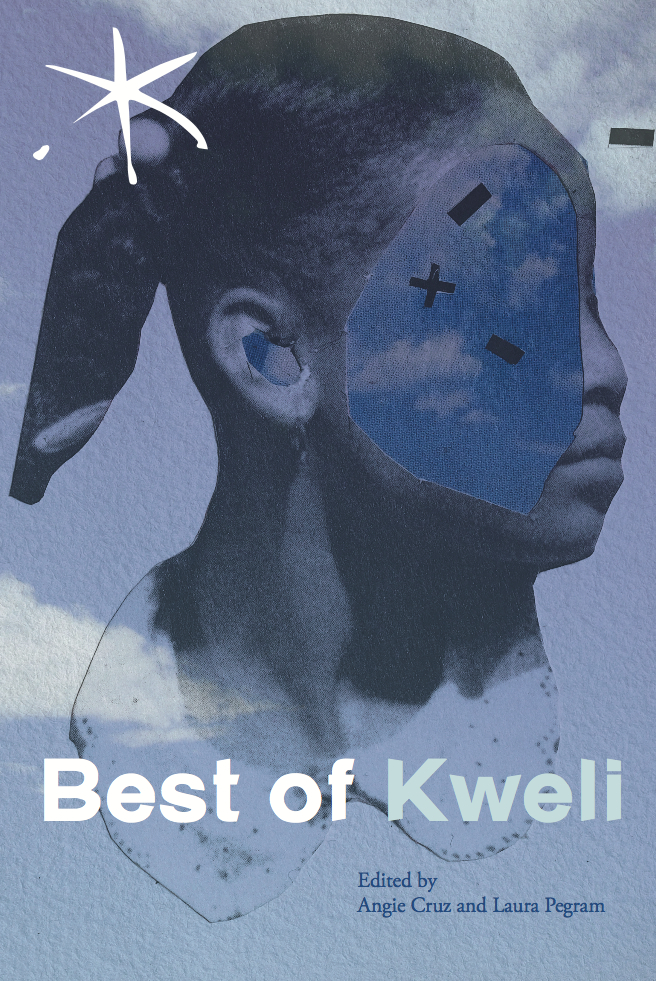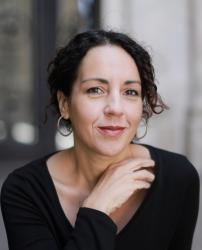
And who will join this standing up
and the ones who stood without sweet company
will sing and sing
back into the mountains and
if necessary
even under the sea
we are the ones we have been waiting for
-by June Jordan from Passion (1980)
I met Laura Pegram back in 2009 when she solicited my work for Kweli. I was one of the first writers she published in her journal. Soon after I made a date with her in NYC and since I have been inspired by Laura’s resilience and optimism. She has faced incredible challenges but continues to nurture her writers and her journal, and is always full of ambition for what the journal can and will do. In the spirit of content spilling from one journal to another I have spent the past four months working with Pitt MFA students to cull through seven years of works published in Kweli. Together we selected twenty pieces. No easy feat. For the final conversation and selection, Laura Pegram joined us at University at Pittsburgh. The following is the conversation we had during her visit.
Angie Cruz: Let’s start with you telling us how Kweli came about.
Laura Pegram: Kweli wasn’t a definitive plan until I ended up in the hospital and then in a wheelchair, and my life, as I knew it, completely changed. By that point, I had been living with mixed connective tissue disease (MCTD) for over 20 years. Before I lost control of my legs, I had been actively involved in the arts community. I missed my contact with my students at Frederick Douglass Creative Arts Center (FDCAC), where I had been teaching workshops in the evening. They became my second family. But once I was released from the hospital, the only time I left the apartment was when two brothers from the Windsor Ambulette Service picked me up and carried me, in my wheelchair, down and up five flights of steps to and from New York Presbyterian to see my doctors. The ambulette service charged $200 a trip and it wasn’t covered by insurance, so my home became a prison of sorts. I was newborn weak that first year. My days were structured around all things medical, but I could still dream, and I dreamed up Kweli. This literary baby became a distraction from the head pain, the fear, the doctor visits, all the long and protracted calls from the insurance companies. It took two and a half years to go from Kweli dream to Kweli reality. The journal became a way of continuing the work I had started as a writer, as an activist, from the convenience of my home.
It took time for me to learn how to walk again and it took time for Kweli to take its first steps. I invited some of my former students and colleagues from FDCAC to join as Kweli editors and board members. Trinee, Gena and Nicole would come to my small walk-up apartment and plan and brainstorm a vision. FDCAC was one of my greatest gifts. Sadly, it is no longer in existence, but that was my home when I was a shy student who was learning and growing and developing my craft.
AC: Can you talk about June Jordan, who was your teacher?
LP: Ah, yes! June was not only my teacher, she was also my second mother, my mentor. She was an amazing poet, activist, and essayist. In college, June awakened me not only to what was going on politically in the world, but to my power as a citizen of the world. She was the introduction to my activism. She was also the person who told me that the sky was my ceiling despite my limitations. Autoimmunity is on the rise in the black community and it is difficult to diagnose. As an undergraduate, I was in and out of the hospital pretty frequently. And June was always there with books! Poetry books, fiction, non-fiction, plays. Flowers and laughter filled the room. No matter where I was medically, somehow June always had a way of making me laugh, seeing things through a more hopeful lens no matter how bleak they may have seemed at the time. She showed my early writings to her circle of writer friends, introduced me to artists who would become mentors on the page. They all helped me to build my confidence, to raise my voice beyond that whisper. So I’m eternally grateful to her for everything she taught me and brought to me.
AC: You are a writer, but you are focused mostly now on editing?
LP: My writing has taken a second seat to Kweli, but I am slowly carving out more time for my stories and poems. Working as an editor came about because I saw a need. I had a lot of friends telling me they were more accustomed to rejection letters than not, and a lot of them were giving up. Kind of moving away from their love of the art and what it could do, so I thought I could change that up a little bit.
AC: Unlike many journals where writers receive form letter rejections, you actually read all the submissions with care and give them feedback. Could you talk about that process a little bit? About how you work with writers?
LP: Yes. Out of all the things I do with Kweli, the one-on-one relationship with the writer is what I enjoy most. I love spending that time with them and their work, getting to know their process, what takes time and what is effortless. Talking with them about how to strengthen their work is one of my greatest joys. But it is also time consuming. One piece can go through twelve to twenty drafts and then there are the lessons on craft (compression, contradictions of character, etc.). I push them in the way June pushed me. If I submitted something to her for review, she didn’t let me get away with anything. She would return my manuscripts with red marks on each page. But when it was ready, she would say, ‘now, that’s a story.’
AC: So much work!
LP: And the workload grows exponentially each day. I teach as well, at Poet’s House for writers based in the NYC area, and then online. Some of my international students are based near Ramallah, Istanbul, Iran, Canada, so Kweli has a global reach. That started from the very first call for submissions that we put out. We sent word to VONA and Cave Canem–established entities of color–and we got submissions from across the globe. So that was surprising because I always thought Kweli would be this small, local community, but it blew up faster than I thought it would or could.
AC: In 2014, you invited a number of writers to be guest editors. How did you like that process? I mean, you had to give up control a little bit.
LP: I did, but I got a little bit more sleep! At that time we were a quarterly, and it was a lot of work to do developmental and line edits. You have to sacrifice so much to get it all done by deadline. The to-do lists get larger at the end of each day instead of smaller. That’s just the way of the nonprofit world. They demand a lot, they want to know you’re accountable. So yeah, the guest editors helped me out tremendously. They gave me some breathing room.
AC: I’m curious about your decision to make Kweli a nonprofit instead of a grassroots effort. Have you had to make changes now that you are accountable to a board?
LP: We have always had to be accountable to the board of directors. They were artist friends and colleagues who believed in the mission of Kweli. The makeup of the board has shifted a bit over time. But raising funds in the first three years was hard. You can’t apply for grant funding in those first years. I was taking care of Kweli deficits out of my own pocket and my pockets weren’t that deep after I became disabled, I was living off of a monthly disability check.
AC: For years you have been paying writers out of your own pocket, right?
LP: At first I was like, ok, I can handle this. We started out as a biannual. I’ll make it work. But by the second year it was no longer sustainable. I knew we had to look at getting our nonprofit incorporation quick so that we could get charitable donations. That made it possible for us to get a couple dollars here and there, and to get grants funding too.
AC: Kweli has committed more and more resources to children’s literature, publishing more YA authors and hosting an annual conference. Can you tell us a little bit about it?
LP: We held our first mini conference in 2010 in the courtyard of La Casa Azul Bookstore in East Harlem. It catered to writers of young people’s literature as well as to writers of adult fiction and nonfiction. After a few years, we decided to scale back from this multi-genre effort . The Color of Children’s Literature has been well received. We were inspired by Charles Johnson’ article, The Color of Children’s Literature. Edwidge Danticat was our keynote speaker in April 2016, and we had a standing room only crowd. It was great, but we exceeded the limitations for the space we rented. We’re hunting for a larger space next year and it looks like the New York Times Conference Center will be the home for our 2017 conference.
AC: So what were some of the takeaways? I know you had industry people there, what’s the action plan to make change?
LP: One of the things we want to do is not only help emerging writers develop their craft, but then introduce them to the editors and the agents that can help them build a career. So at each conference we have agents, editors who are actively looking for writers of color. We allow them [conference attendees] to have one-on-one sessions for critiques with them.
AC: So what do you think could be a possible solution for the challenges in publishing right now?
LP: I think we definitely need more editors of color. There is such a dearth. The problem lies in compensation. Most people graduate from college with loans so they can’t look at publishing, editorial salaries as a way to begin.
AC: Also it seems that editors are not willing to take risks. I know for instance a good number of latino/a writers with books who can’t find a home for them. It’s mind boggling when you can count on one hand how many books by latino/as are published each year. I can see why so many writers of color have given up.
LP: But the yeses come. I always tell folks who submit to Kweli that the yes will come. You just need one yes. One of Kweli’s just emailed me last week, and said that she has a publisher for her short story collection. After years of putting her work out there and getting no no no no nos, she got two yeses within one week. How’s that?
AC: So it is persistence, but also it’s about staying inspired. I found this quote by Junot [Diaz] that resonates with me. He said, “You know, vampires have no reflections in a mirror? There’s this idea that monsters don’t have reflections in a mirror. And what I’ve always thought isn’t that monsters don’t have reflections in a mirror. It’s that if you want to make a human being into a monster, deny them, at the cultural level, any reflection of themselves. And growing up, I felt like a monster in some ways. I didn’t see myself reflected at all. I was like, “Yo, is something wrong with me? That the whole society seems to think that people like me don’t exist?”
LP: I love that quote.
AC: We need to keep the pressure on about diversity in publishing but also make an effort to see each other. If we start internalizing not being seen, it can make us monstrous. Often when we do see our selves reflected back at us in the mainstream it’s an exaggeration or a distorted version of who we are. For me, as an editor, the reason I was excited to revisit the works in Kweli and sift through it with the MFA students at Pitt is because there’s so much content online. And I think this is one way we can create an opportunity to revisit content, so these important voices won’t get lost in all the noise.
LP: Thank you for opening up our work to new audiences.
AC: Thank you Laura for introducing us to these amazing writers who are featured in this issue. And also I want to thank the Pitt MFA students who read the poems and prose with such care.
LP: Thank you so much, Angie. And many thanks to your students.

Angie Cruz's novel, DOMINICANA is the inaugural bookpick for GMA book club, and the Wordup Uptown Reads selection for 2019. It was also longlisted for the Andrew Carnegie award in excellence in fiction for 2019. It was named most anticipated/ best book in 2019 by Time, Newsweek, People, Oprah Magazine, The Washington Post, The New York Times, and Esquire. Cruz is the author of two other novels, Soledad and Let It Rain Coffee. She's the founder and Editor-in-chief of the award winning literary journal, Aster(ix)and an Associate professor at University of Pittsburgh where she teaches in the MFA program. She splits her time between Pittsburgh, New York, and Turin.







